 Petzlover
Petzlover Both Burmese and Javanese are originated from United States. Both Burmese and Javanese are having almost same weight. Both Burmese and Javanese has almost same life span. Both Burmese and Javanese has same litter size. Both Burmese and Javanese requires Low Maintenance.
Both Burmese and Javanese are originated from United States. Both Burmese and Javanese are having almost same weight. Both Burmese and Javanese has almost same life span. Both Burmese and Javanese has same litter size. Both Burmese and Javanese requires Low Maintenance.
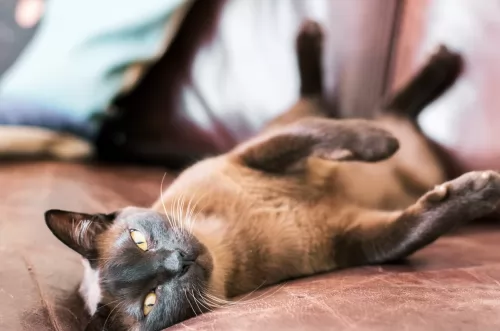 A dark brown cat together with Dr Joseph C. Thompson made their way from Burma to the United States in 1930. Cat fanciers believed that it was a dark-colored Siamese.
A dark brown cat together with Dr Joseph C. Thompson made their way from Burma to the United States in 1930. Cat fanciers believed that it was a dark-colored Siamese.
Dr. Thompson along with other breeders decided to breed the cat and she was the start of the Burmese breed.
Hybrids however, began appearing in the show hall in 1947. This was considered a violation of the show rules of the Cat Fanciers' Association and recognition of the Burmese was withdrawn until 1953. The Burmese Cat Society of America then had to give assurance to the registries that this type of thing would not happen again.
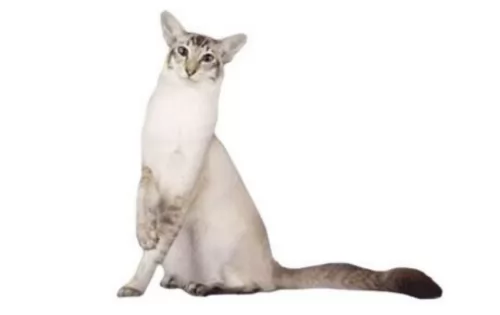 The Javanese is also known as the Colourpoint Longhair in some cat registries, but it's a purebred domestic cat that was developed in North America.
The Javanese is also known as the Colourpoint Longhair in some cat registries, but it's a purebred domestic cat that was developed in North America.
It was Helen Smith that coined the name Javanese cat in 1950 with the name being derived from the tradition where cats of the Orient have the names of the countries and islands of south-east Asia.
The name Javanese was chosen by choosing Java, an island near Bali.
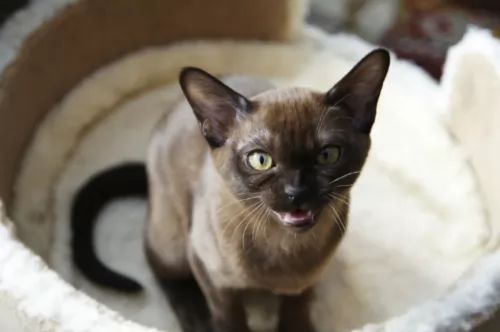 The Burmese is a medium-sized cat - fairly stocky and solid and weighs between 3 and 5kg.
The Burmese is a medium-sized cat - fairly stocky and solid and weighs between 3 and 5kg.
The dense, short coat of the Burmese comes in a variety of colors such as chocolate, cream, sable, red, tortoishell and solid colors too. The color you are most likely to see is sable.
It’s a low shedding cat so his grooming needs are low. The eyes, often a beautiful yellow shade, can be in different shades of yellow really.
Your gorgeous Burmese cat is a curious cat and finds exploring new places a huge adventure. They’re prepared to get on with some other pets in the home, but they may not be happy to welcome all cat breeds. The Burmese don't particularly like sharing their home and his human family with other cats in the home and love to get all the attention for themselves.
Once these cats mature, they do tend to settle down quite a bit and become placid, being a spectator to fun activities rather than a participant.
Still, they love their humans and are more than happy to find a place in the sun and to watch everyone from there.
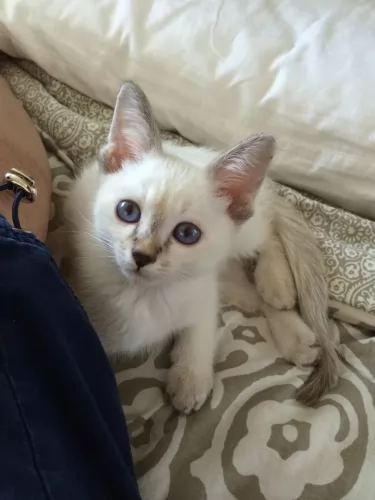 The Javanese is a medium-sized, slender, muscular cat that weighs between 3 and 6kg. It has a short or long, silky coat that comes in a number of colors. The short-haired variety has a single coat, in contrast to the double coat found in the long-haired breeds.
The Javanese is a medium-sized, slender, muscular cat that weighs between 3 and 6kg. It has a short or long, silky coat that comes in a number of colors. The short-haired variety has a single coat, in contrast to the double coat found in the long-haired breeds.
The tail is fairly plumed. The Javanese also has point coloration which means that the body is paler than the darker face. The coat comes in a variety of colors and patterns, from dark brown to cream to tortoisehell and others. The ears are large and the almond-shaped eyes are always blue.
Siamese and the Javanese differ a little in coat length and color but otherwise they are much the same in temperament. They love their human families and will follow them around like a dog.
When you sit down they like to curl up in your lap and simply be around you. They may not be as vocal as the Siamese but he is still prepared to have a jolly good conversation with you.
They’re clever cats too and like stimulating games and toys. He loves to climb, so a climbing tree will be excellent for him. He also likes being busy, so if you leave him alone for a length of time, ensure that he has activities to keep him happily amused.
If you have a Javanese be sure to include him in your activities just like you would a child of yours.
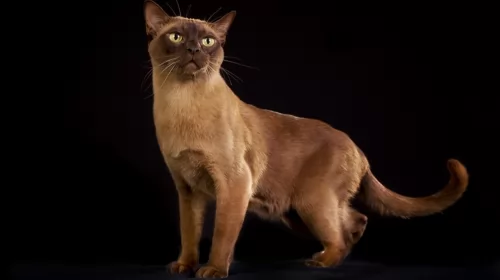 The Burmese cat loves to climb and survey his world from a high perch so don’t forget to invest in some kind of climbing apparatus or cat tree for him.
The Burmese cat loves to climb and survey his world from a high perch so don’t forget to invest in some kind of climbing apparatus or cat tree for him.
He tends to become a bit inactive as he gets older and this can be a problem and lead to obesity. Encourage your Burmese cat to come out and play to make sure he gets enough exercise.
He loves being noticed by his human family and will thrive on being petted and noticed, and of course, you’ll want to, as a Burmese has got a whole love of loving to give you too.
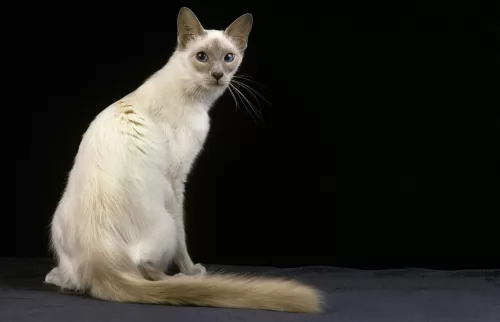 Your medium-sized Javanese cat is active and talkative. These are cats that love leaping up onto high perches and into trees and it is therefore imperative that you invest in climbing equipment for him.
Your medium-sized Javanese cat is active and talkative. These are cats that love leaping up onto high perches and into trees and it is therefore imperative that you invest in climbing equipment for him.
These slender Oriental cats need an excellent diet to maintain the fine-boned, muscular physique. You don’t want your Javanese becoming overweight as this spells bad health and sluggishness.
The Javanese is such a lively cat if his weight is maintained and he loves being around his human family, purring away while he is lovingly made a fuss of.
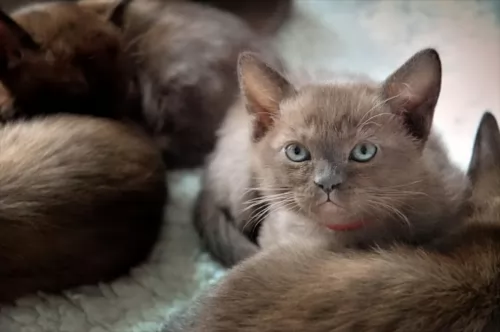 These cats are a healthy breed and if you take good care of your Burmese he can live to up to 13, 14 or 15 years of age.
These cats are a healthy breed and if you take good care of your Burmese he can live to up to 13, 14 or 15 years of age.
But you have to be aware of diabetes mellitus as well as something known as hypokalaemic polymyopathy – muscle weakness because of low blood potassium levels.
You’ve also got to look out for obesity as these are sturdy, stocky cats and overeating can lead to obesity and a host of health issues such as painful joints and diabetes.
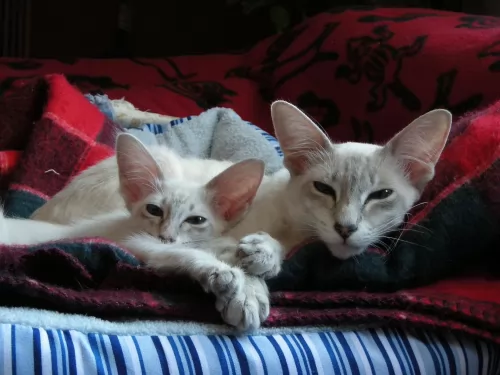 The same health issues that you’re likely to pick up with the Siamese may well be found in the Javanese too.
The same health issues that you’re likely to pick up with the Siamese may well be found in the Javanese too.
Some of the health issues to look out for include among others, asthma or bronchial disease, heart defects, lymphoma as well as gastrointestinal conditions.
For the health of your Javanese cat, make sure the vaccinations are up to date.
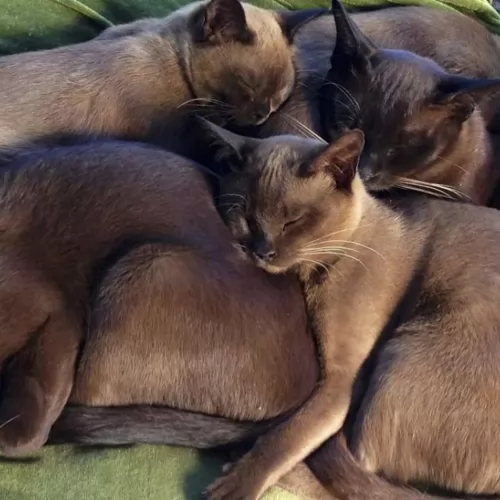 Burmese cats are naturally good climbers and you will need to provide these cats with some kind of climbing tree or something else where they can climb and perch.
Burmese cats are naturally good climbers and you will need to provide these cats with some kind of climbing tree or something else where they can climb and perch.
While adult Burmese cats tend to be fairly placid cats, they still love to play and love the interaction between themselves and their humans. As he gets older, don’t forget to keep up a regular playtime with him.
Shedding is minimal with the Burmese cat and weekly brushing will be a good bonding session and also keep your Burmese cat’s coat healthy and shiny by removing dust and loose hair.
Your fur child requires the best – a balanced cat food packed with protein to support him in all his activities and to ensure he maintains a good weight.
There are many excellent commercially manufactured cat foods on the market so learn to understand the ingredients and what nutrients are required.
Certainly, your Burmese kitten will require a complete and balanced kitten food with all the right nutrients to ensure good bone and coat growth. Then it is time to choose a kitten food which will later change to adult food as your kitten matures.
There are excellent cat foods for every stage and season of your cat’s life and from top brands – people who know the needs of cats.
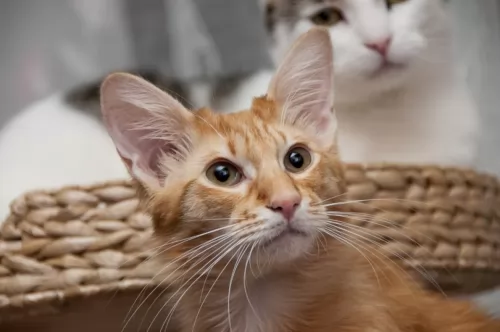 Cats are carnivores and have special dietary needs. They have unique nutritional needs, something like lions and cheetahs.
Cats are carnivores and have special dietary needs. They have unique nutritional needs, something like lions and cheetahs.
Their protein needs are very high, especially when they are kittens or nursing mothers. They need animal protein in their diets. Some of the unique nutritional needs of cats require them to have this protein as well as very important amino acids such as arginine and taurine.
Just because your cat needs such a high intake of protein, it doesn’t mean he won’t need other nutrients. Cats need balanced nutrition that is right for them. The best commercially manufactured cat food with fats, carbs, minerals, and vitamins will ensure a healthy cat. Speak to your vet if you’re not sure.
Not all cat foods are the same and choosing the right cat food will ensure your cat gets a sufficient dose of protein powder. So important is a cat’s diet for good health, that it will be important to speak to your vet about the food requirements of cats.
With grooming, the fine silky coat can be cared for easily by giving it a brush each week. You want to remove loose hairs from shedding. You can also take a damp cloth and wipe your Javanese down.
The nails will also need to be trimmed. When you brush your cat, check up on other things too.
Make sure the eyes are nice and clear, the fur soft and vibrant, make sure there are no new and unusual lumps.
Check inside his mouth for bad teeth that could be causing all kinds of health issues and check inside his ears too. For all these grooming issues, a pet grooming parlor can do it all for you.
Provide your Javanese with a litter box and keep the box scrupulously clean.